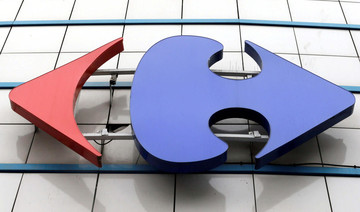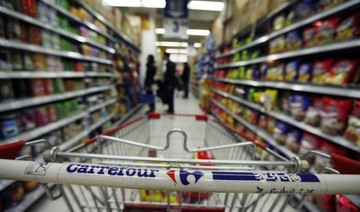PARIS/LONDON: Europe’s largest supermarket groups Carrefour and Tesco have agreed to form a global purchasing alliance to demand better terms from major suppliers in the latest attempt by the industry to cut costs.
With combined annual sales of $170 billion, the partnership is designed to secure lower prices from the likes of Nestle, Procter & Gamble, Unilever, Danone and others to help the French and British groups stay competitive at home and abroad.
The announcement marks the latest reinvention in an industry that is grappling with the rapid move online, competition from discount groups such as Aldi and Lidl and the looming shadow of US Internet giant Amazon.
Analysts said the combined firepower should help Carrefour, which has lower margins than Tesco, but warned it could lead to a spiralling price war. Suppliers said it posed a threat to their survival.
“This ... combines the purchasing expertise of two world leaders, complementary in their geographies, with common strategies,” said Carrefour CEO Alexandre Bompard.
The alliance will cover strategic relations with global suppliers in areas such as marketing services or data collection as well as the joint purchasing of own-brand products and goods used in their own businesses, Carrefour said.
The alliance, which will be formally agreed in the next two months, is unlikely to include fresh food products as each company will continue to work with supplier partners at a local and national level.
Financial terms were not disclosed. The companies said it would be governed by a “three-year operational framework.”
“By working together and making the most of our collective product expertise and sourcing capability, we will be able to serve our customers even better, further improving choice, quality and value,” said Tesco CEO Lewis.
Lewis joined Tesco from Unilever where he ran its personal care division.
Analysts at Jefferies estimated the deal could lead to initial total savings of 400 million pounds or 450 million euros.
“More generally we wonder whether the advance of players like Amazon and the German discounters (businesses underpinned by truly global supply chains) will continue to force a drastic change in sourcing processes,” they said.
European groups Auchan Retail, Casino, Metro and Schiever agreed their own purchasing partnership last week.
Tesco faces a threat to its market leadership in Britain after second-ranked Sainsbury’s agreed to buy Wal-Mart owned Asda, the number three player. It said in June it would cut food prices to stay ahead of rivals.
Some analysts speculated that the Carrefour-Tesco alliance could even be the precursor to a merger between the two.
TOUGH TIMES
Carrefour and Tesco have limited overlap and the partnership excludes the two countries where they do — Poland and China.
Carrefour, Europe’s largest retailer, makes the bulk of its 88 billion euros ($102.5 billion) worth of sales in Europe and Brazil while Tesco operates in Britain, Ireland, eastern Europe, Malaysia and Thailand, and has a wholesale presence in India.
The two groups also face challenges on the horizon.
Carrefour has issued cautious targets for this year after weakness in its home market weighed on sales growth in the first three months of the year.
In January it announced plans to cut costs and jobs, boost e-commerce investment and seek a partnership in China, in an effort to lift profit and revenue and beat domestic rivals in the race to develop digital shopping products.
It has already agreed a five-year purchasing alliance with French supermarket firm Systeme-U to make Carrefour the biggest buyer in its home market where competition has been fierce.
Smaller rival Casino’s Monoprix chain in March became the first local retailer to sell groceries via Amazon in the Paris area. This followed a deal last year between Casino and grocery e-commerce tech provider Ocado Group Plc.
Tesco, with sales of 51 billion pounds ($67.2 billion), has rebuilt itself under Lewis after the discovery of an accounting scandal in 2014 compounded a sharp downturn in trading, which strained relations with its suppliers at the time.
The group has cut costs, invested in stores and bought wholesaler Booker to be able to expand into supplying restaurants, cafes and local stores.
Shares in both Carrefour and Tesco made only modest gains, with European stock markets under pressure.
Mella Frewen, director general of industry body FoodDrinkEurope, warned that the creation of such huge buying alliances threatened her members
“On top of the recent Sainsbury — ASDA alliance, this will have a huge impact on the balance of power along the food chain, to the detriment of all suppliers, regardless of size.”
Jonathan Buxton, head of Consumer and Retail at M&A advisory group Cavendish Corporate Finance, said the partnership was designed to contain discounters, defend margins and counter any future move by Amazon.
“While the partnership stands to partially solve the significant strategic and market issues both retailers face, there is clear logic for the deal to become permanent and could result in a formal merger between the two firms.” ($1 = 0.7595 pounds) ($1 = 0.8587 euros)
Retailers Carrefour and Tesco join forces in strategic alliance to boost purchasing firepower
Retailers Carrefour and Tesco join forces in strategic alliance to boost purchasing firepower
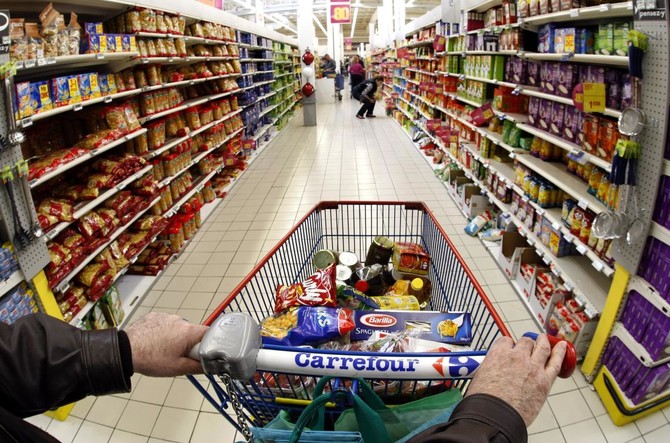
- Carrefour and Tesco agree to form a global alliance aimed at cutting costs
- The move comes as Amazon makes inroads into European market and suppliers are concerned that they risk being squeezed hard
Saudi energy minister lauds growing economic ties with Uzbekistan

RIYADH: Saudi Arabia and Uzbekistan’s economic cooperation models reflect mutual commitment to prosperity through shared goals in the two countries’ 2030 plans, said the Saudi energy minister.
During the main dialogue session of the third Tashkent International Investment Forum, Prince Abdulaziz bin Salman emphasized the distinguished relations between the two nations and the commitment of their leaderships to enhance and develop cooperation in all fields, particularly in the energy sector.
Uzbekistan President Shavkat Mirziyoyev also attended the meeting.
The Saudi minister pointed out that economic cooperation between the two countries serves as a model, especially in light of the “Uzbekistan 2030” strategy and the Kingdom’s Vision 2030, with their similar goals aimed at economic growth, diversification, and sustainable development, reflecting a mutual commitment to building a prosperous future for both nations, according to the Saudi Press Agency.
“The bilateral relations saw a notable advancement subsequent to a meeting between Crown Prince Mohammed bin Salman and President Mirziyoyev in Riyadh in 2022,” he said.
Prince Abdulaziz stressed the significance of the energy sector in the growing relations between the two nations, particularly in renewable energy, highlighting the substantial involvement of Saudi companies in Uzbekistan, exemplified by ACWA Power.
He elaborated on the investment flowing between the two countries in this domain, eclipsing $14 billion, with the aim of producing over 11 gigawatts of renewable energy electricity, affirming that Uzbekistan has demonstrated a serious commitment to achieving a fair and equitable energy transition, aligning with the Kingdom’s aspirations.
The energy minister further underscored the rational stances jointly embraced by both nations, placing significant emphasis on the critical aspects of energy security, development, and conservation.
He also underscored the two countries’ collaborative roles in addressing climate change through collective endeavors.
Recently, ACWA Power signed a power purchase agreement with the National Electric Grid of Uzbekistan for the Aral five-gigawatt wind power project worth SR18.2 billion ($4.85 billion).
Two weeks ago, ACWA Power announced it had secured an $80 million equity bridge loan from the Bank of China for its projects in Uzbekistan.
The Saudi entity said the fund will boost its Tashkent 200 megawatts solar photovoltaic power plant and 500 MW per hour battery energy storage system project in Uzbekistan.
“This transaction culminated the initial agreement reached during the 3rd BRF (Belt and Road Forum) summit in October 2023, where ACWA Power was represented by its chairman as a keynote speaker,” the company said in a statement.
Alvarez & Marsal opens regional headquarters in Riyadh
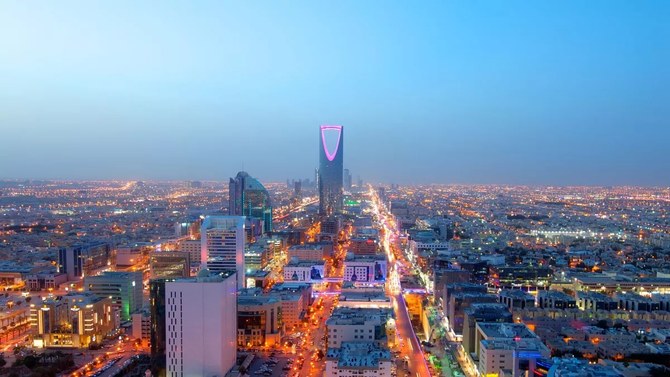
RIYADH: Underscoring international confidence in the Saudi economy, global consulting firm Alvarez & Marsal has become yet another company to have opened its regional headquarters in Riyadh.
In a press statement, the US firm stated that the inauguration of the new regional headquarters underscores its commitment to contributing to the country’s transformation agenda.
“As the company continues to deepen its roots in the country, with expertise across various sectors — from banking and tax to healthcare and disputes and investigations — this strategic move aims to leverage local insights in the Kingdom to drive sustainable growth and innovation.” the company said.
Additionally, A&M announced that it has included 13 skilled Saudi graduates in the inaugural batch of its Bidayah Graduate Program.
The company stated that these candidates were selected from a competitive pool of applicants, describing the chosen individuals as representing the bright future of the Kingdom and reflecting the potential that A&M sees in local talent.
James Dervin, managing director of A&M in the Middle East and co-head in the region, stated that the program is designed to develop the next generation of execution-focused leaders in management consulting. It is guided by the A&M principles of leadership, action, and results.
“Over the course of 12 months, participants will undergo rigorous training, engage in live project work, and receive mentorship from seasoned industry experts,” he said.
Dervin added: “Coupled with the incorporation of our regional headquarters in Saudi Arabia, the program underscores A&M’s commitment to investing in the professional development of Saudi nationals and aligning with the Kingdom’s ambitious Vision 2030,”
He further noted that the new graduates will have a significant, positive impact on his firm and the clients it serves.
Commenting on the close alignment of A&M’s global brand with the local market dynamic in Saudi Arabia, Bryan Marsal, A&M’s CEO and co-founder, said: “The all-encompassing nature of the Saudi Arabian transformation is driving significant demand for A&M’s distinctive ‘get-stuff-done’ brand of services — for our ability to fix problems, our ‘skin in the game’, and our freedom from audit conflicts.”
With over 9,000-strong workforce across six continents, A&M generates tangible results for corporations, boards, private equity firms, law firms, and government agencies grappling with intricate challenges, according to its website.
More than 180 major global companies and organizations have already established regional headquarters in the Saudi capital. These include Apple, Microsoft and Alibaba, as well as the IMF, IBM, and Google.
Other notable entities on the list include German consultancy firm TUV Rheinland, PwC Middle East, Aramex and Amazon.
UAE banks’ aggregate capital, reserves exceed $136bn
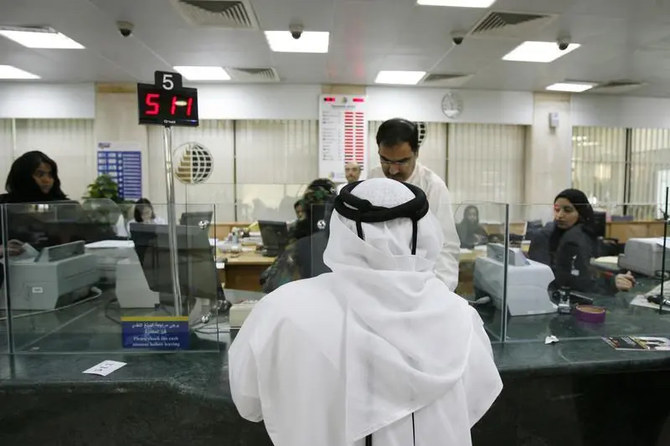
RIYADH: UAE-based banks’ aggregate capital and reserves reached 501.5 billion dirhams ($136 billion) at the end of February, up 14.4 percent year-on-year, according to new data.
The latest statistics from the Central Bank of the UAE showed that on a monthly basis, the total capital and reserves grew 0.95 percent, reflecting an increase of approximately 4.7 billion dirhams, according to the Emirates News Agency, also known as WAM.
This rise in figures falls in line with the central bank’s goal of enhancing monetary and financial stability in the country.
Moreover, the data indicated that national banks accounted for around 86.5 percent of the aggregate capital and reserves of banks operating in the UAE. At the end of February, they recorded a total of 433.7 billion dirhams, an annual rise of 14.6 percent.
On the other hand, the share of foreign banks settled at 13.5 percent, hitting 67.8 billion dirhams at the end of the same month, reflecting a 13.2 percent surge compared to the same period a year earlier.
Furthermore, at the end of February, the total capital and reserves of banks operating in Dubai alone stood at 246.4 billion dirhams, logging a year-on-year growth of 15.1 percent.
Additionally, banks operating in Abu Dhabi recorded around 217 billion dirhams, up 13 percent from the corresponding period in 2023.
Meanwhile, the cumulative capital and reserves of banks operating in other emirates combined reached an estimated 38.1 billion, reflecting a 15.5 percent climb in comparison to the same period a year prior.
In March, a top executive at Roland Berger said that UAE bank branches were witnessing the highest revenues in the region, amounting to $18.6 million per branch.
This was driven by the nation’s digital transformation, which enabled financial institutions in the Gulf Cooperation Council to reduce the number of banking branches by 328 within three years, Saumitra Sehgal, the global consulting firm’s head of financial services in the Middle East, told WAM, at the time.
Sehgal also pointed out at the time that the number of bank branches across GCC nations decreased from 4,067 at the end of 2019 to 3,739 by December 2022.
He further noted that banks in the UAE saw the highest number of outlets merge and reduce with the support of digital transformation between 2019 and 2022.
Saudi financial robo-advisory firm Abyan Capital secures $18m in funding
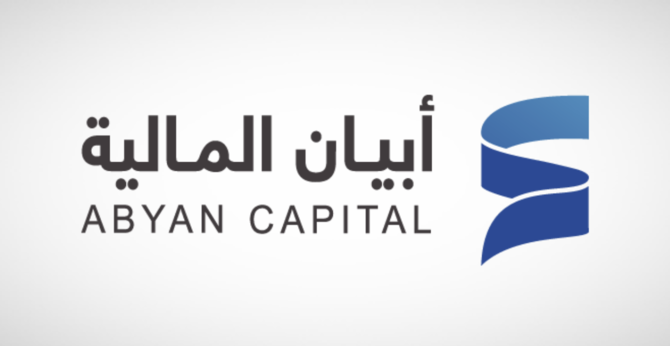
RIYADH: Financial robo-advisory firm Abyan Capital has secured $18 million in funding in further evidence of the growing confidence in the Kingdom’s artificial intelligence sector.
Led by STV, the funding round also saw participation from Aramco’s Wa’ed Ventures and RZM Investment.
Robo-advisors are digital platforms that utilize AI and machine learning algorithms to automate and optimize investment processes.
Founded in 2022 by Abdullah Al-Jeraiwi, Omar Al-Mania and Saleh Al-Aqeel, Abyan Capital is a financial services company that provides an automated solution and portfolio management for long-term investments.
“Abyan Capital stands out by unlocking the SR300 billion ($80 billion) investment management and wealth advisory sector for investors from all backgrounds in Saudi Arabia, through its mobile-first, robo-advisory model,” Yazeed Al-Turki, principal at STV, said in a statement.
In a short period of time, he said Abyan has enabled a large base of first-time investors to access multiple wealth management solutions, underscoring the team’s commitment to innovation and inclusivity.
“We are delighted to partner with Abdullah, Saleh and the team on their journey to redefine the wealth management ecosystem in the Kingdom,” Al-Turki added.
The company aims to utilize its newly secured funds to further enhance its platform, expand its suite of financial products, and accelerate its market penetration across the investment solution value chain.
“Today, we are proud that in a very short amount of time, Abyan has exceeded deposits of over SR1.4 billion and more than 100,000 portfolios invested. And we will be launching new diversified products soon with a goal to make Abyan the digital retail investment house,” said Al-Jeraiwi, the CEO.
Closing Bell: TASI ends the week in green at 12,352
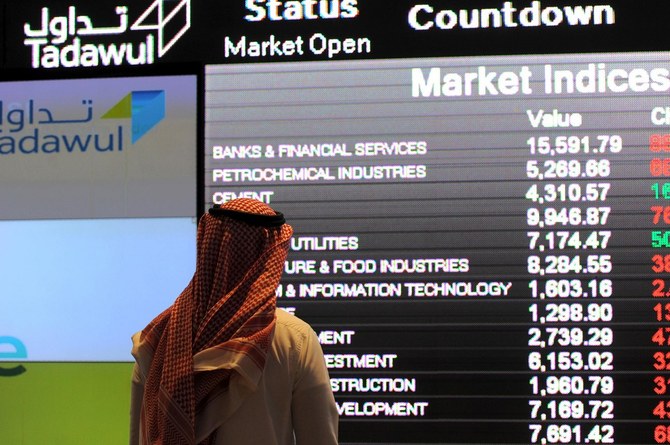
RIYADH: Saudi Arabia’s Tadawul All Share Index ended the week by gaining 6.68 points, or 0.05 percent, to close at 12,352.33 on Thursday.
The total trading turnover of the benchmark index was SR6.55 billion ($1.74 billion) as 120 stocks advanced, while 103 retreated.
The parallel market, Nomu, also gained 95.60 points, or 0.36 percent, to close the trading session at 26,457.81. This comes as 29 stocks advanced, while as many as 27 retreated.
On the other hand, the MSCI Tadawul Index slipped by 2.37 points, or 0.15 percent, to close at 1,547.20.
The best-performing stock on the benchmark index was Al-Baha Investment and Development Co., as its share price surged by 7.69 percent.
Other top performers included Raydan Food Co. and the Company for Cooperative Insurance, whose share prices soared by 7.29 percent and 6.63 percent, to stand at SR30.90 and SR160.80 respectively.
Electrical Industries Co. and the Mediterranean and Gulf Insurance and Reinsurance Co. also fared well during the last trading session of the week.
The worst performer was Saudi Chemical Co., whose share price dropped by 5.36 percent to SR7.77.
Power and Water Utility Co. for Jubail and Yanbu as well as the National Company for Glass Industries, underperformed as their share prices dropped by 5.22 percent and 4.82 percent to stand at SR63.50 and SR42.45, respectively.
On the announcements, Bank AlJazira announced its interim financial results for the period ending March 31 with net profit amounting to SR300.4 million compared to SR279.3 million in the previous quarter.
In an official statement on Tadawul, the bank attributed the increase in the net income to a decrease in total operating expenses by 6 percent.
“The decrease in total operating expenses is mainly due a decrease in net impairment charge for financing and other financial assets, other general and administrative expenses, salaries and employee-related expenses and other operating expenses against an increase in depreciation and amortization expenses,” the statement said.
Conversely, there has been a slight decrease of 0.2 percent in total operating income, primarily attributed to a reduction in net financing and investment gains. Additionally, the rise in net income was partially tempered by increased zakat charges over the period.


